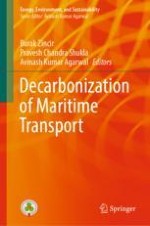2023 | OriginalPaper | Buchkapitel
10. Energy Efficiency and Management Onboard Ships
verfasst von : M. Ziya Sogut, Suleyman Ozkaynak
Erschienen in: Decarbonization of Maritime Transport
Verlag: Springer Nature Singapore
Aktivieren Sie unsere intelligente Suche, um passende Fachinhalte oder Patente zu finden.
Wählen Sie Textabschnitte aus um mit Künstlicher Intelligenz passenden Patente zu finden. powered by
Markieren Sie Textabschnitte, um KI-gestützt weitere passende Inhalte zu finden. powered by
